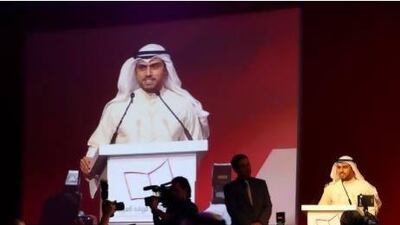Saud Alsanousi was declared winner of the sixth International Prize for Arabic Fiction (IPAF) at a Tuesday night ceremony. He tells us more about his novel.
The award winner
In a win for the GCC, the Kuwaiti journalist Saud Alsanousi took the International Prize for Arabic Fiction for his second novel, The Bamboo Stalk, on Tuesday, defeating six other shortlisted entries.
Supported by London's Booker Prize Foundation and funded by TCA Abu Dhabi, the prestigious IPAF award gifts Alsanousi up to US$60,000 (Dh220,400) in addition to guaranteed English publication of his prize novel at a later date.
Speaking in a quiet room away from the cameras and hordes of well-wishers, Alsanousi finally allowed his achievement to seep in. "It is just amazing," he says. "Of course, when you are writing a novel or any piece, really, you are not thinking about the awards or anything like that. So to win is a wonderful feeling and will only motivate me."
The novel
While most of the shortlisted titles lifted their plots from news headlines, The Bamboo Stalk focuses on what happens behind the closed doors of households in the Gulf region. The central character Jose is born out of a scandalous affair between a wealthy Kuwaiti businessman and a Filipino housemaid. The toddler is swiftly sent to the Philippines and returns to Kuwait as an adult to a paternal family that refuses to recognise him.
While the book may strongly resonate with Gulf readers, Alsanousi explains it deals with universal themes. "It's a story dealing with very human issues. This is what I want people to take away from it," he says. "The book deals with some heavy themes that affected me as a writer. I wanted the reader to have that same reaction no matter where they are in the world."
The journey
Alsanousi knew when writing the early drafts that a trip to the Philippines was essential to fleshing out his character.
"I went to Manila in addition to some cities in the south and I had a chance to meet with the locals, share meals together and discuss issues affecting the society."
Alsanousi was struck at the Filipino optimism despite some dire conditions. "It was really shocking some of the poverty I witnessed," he says. "But I met some beautiful people there. They were full of kindness and they were very gentle."
These human interactions remained with Alsanousi after he returned to Kuwait. "I went to the Philippines with the eye of a journalist," he says. "I recorded everything and did daily journal entries but in the end all that information couldn't find a place in the novel. It was more about what I and the character Jose felt. In a way, it was in the Philippines where I truly became Jose."
The verdict
Galal Amin, the Egyptian author and literary critic who headed the IPAF judging panel, praised the murky subjects dealt with in the prize-winning work: "It deals with class structure and illustrates that the novel has a role to play in contributing to such a discussion. More importantly, Alsanousi explores this issue in an unsentimental fashion. No one in the novel is crying over spilt milk and it is not a melodrama. It is very subtle and feels like a story lifted from real life."
For details, go to www.ipaf.org
Follow us
Follow us on Facebook for discussions, entertainment, reviews, wellness and news.


